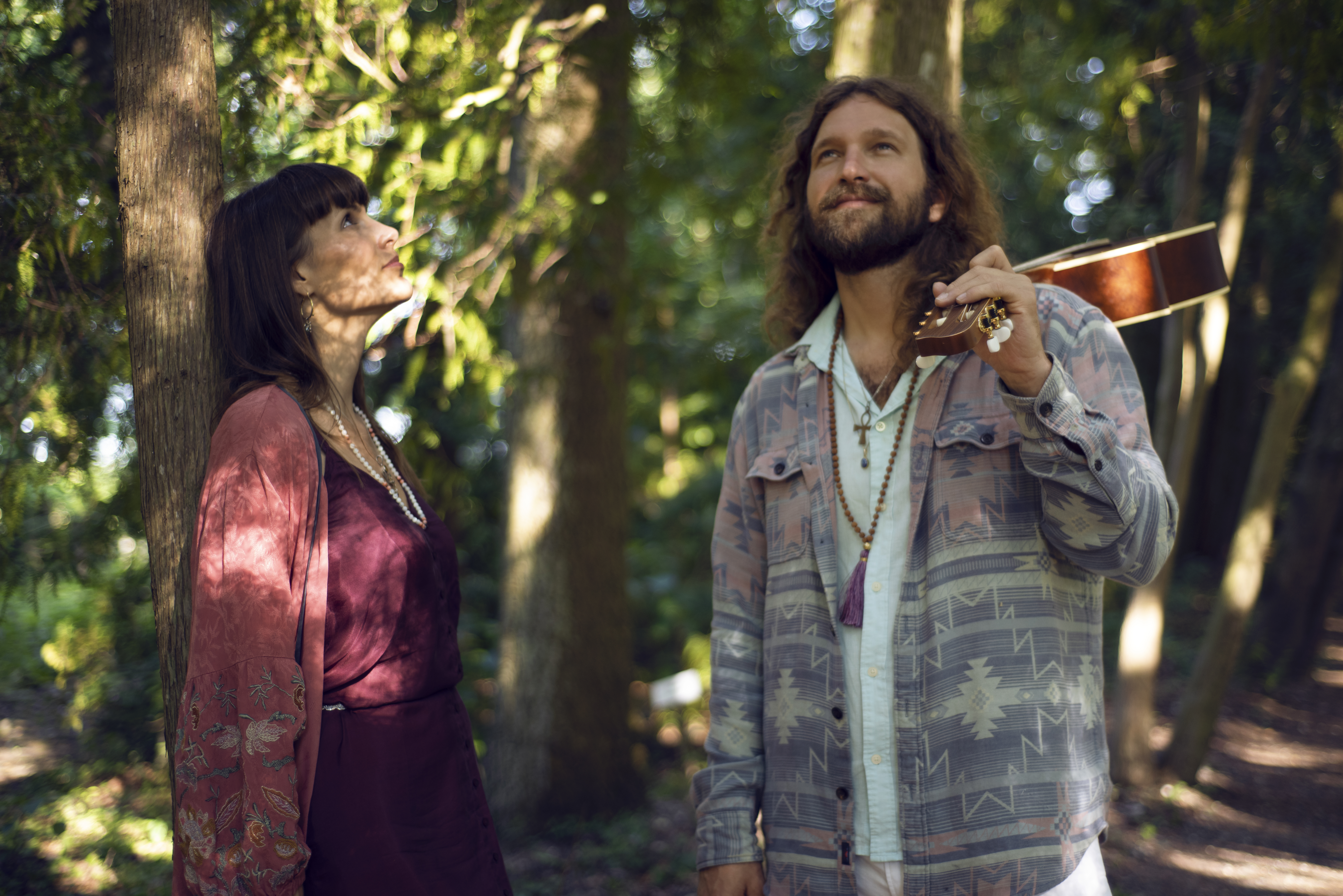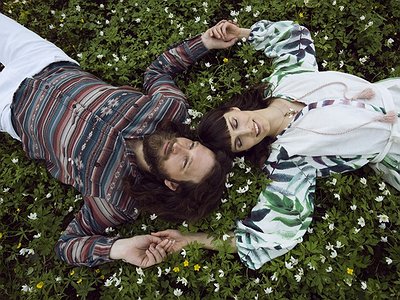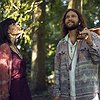Name: Flowers of the Forest
Members: Sigmund Vatvedt, Rutt Treima
Nationality: Estonian (Rutt), Norwegian (Sigmund)
Current release: Flowers of the Forest's The Calling is out now.
Recommendations: The Initiation by Elisbeth Haich. The mysticism of sound and music by Inayat Khan.
Music- Hun Huur Tu, Lisa Gerrard, Chandra Lacombe, Dead Can Dance, ... there are so many :)
[Read our Lisa Gerrard interview]
If you enjoyed this Flowers of the Forest interview and would like to keep up to date with the band and their music, visit the duo on Instagram, and Facebook.
When I listen to music, I see shapes, objects and colours. What happens in your body when you're listening? Do you listen with your eyes open or closed?
Sigmund: When I listen to music, I try to listen with my whole being, so I prefer to lay down or sit very comfortably with my eyes closed. I usually see landscapes, soundscapes, dreamscapes or geometrical shapes. Once in a while I try to imagine the musician playing his or her instrument, how they are doing it and how they look.
If it is a music that is comforting or fits my taste of music, my body gets relaxed and I get into a dreamlike state. If I'm listening to music that is agitating or has chaotic sounds I get stressed.
What were your very first steps in music like and how would you rate the gains made through experience - can one train/learn being an artist?
Sigmund: My first steps were in kindergarden when we sang the songs there, I remember I liked it very much. It continued later in elementary school with different, very simple instruments. This gave already as a child a deep love for music. I also sang in the children’s choir in the church.
One can train to become an artist, but for some it is natural and they don’t need to train, they can just express their natural ability. But for sure one can train to become an artist. It is often perceivable if it is a learned skill or natural talent.
Rutt: There was a lot of music throughout my childhood at home. My mother sang to us and we liked to sing together as a family, with my three sisters and father included. I went to music school as well.
Together with my sisters we loved to create dance and movement to music that we played from the speakers, we created whole worlds and stories of our own just based on the sounds and music.
According to scientific studies, we make our deepest and most incisive musical experiences between the ages of 13-16. What did music mean to you at that age and what’s changed since then?
Sigmund: During that age I had by far my most deep meeting with music. So I agree. When I was 13 we learned to play guitars, drum-sets, piano and singing in school. It was very easy for me to pick up and learn these new modalities.
I played in several bands at that time, ranging from pop to rock. I also started my classical guitar training with a private tutor. This wide exposure to a great variety of style and instruments made me have a very deep, committed and meaningful relationship to music.
Not much has changed since then, except that I'm not exploring so many wide varieties of styles anymore - I'm older and don't need to research that much. Music gave me a direction and the biggest joy of my life at that time. I still play a vast variety of instruments and keep on learning more.
Where does the impulse to create something come from for you? What role do often-quoted sources of inspiration like dreams, other forms of art, personal relationships, politics etc play?
Sigmund: The impulse to create comes from the Great Spirit, or the spiritual realm, my own spirit. Sometimes for Rutt they come through dreams. And sometimes songs and melodies come through personal deep transformative experiences or processes.
We never try to figure out a piece of music with our brain power. It feels like it comes through from the inside or from above. We just need to learn to put ourselves into the position in which we are open to receive and trust the flow of music that is coming through. 
Flowers of the Forest Interview Image by Marin Sild
Paul Simon said “the way that I listen to my own records is not for the chords or the lyrics - my first impression is of the overall sound.” What's your own take on that and how would you describe the sound you're looking for?
Sigmund: Generally it's about the combination of the sonic frequencies, the sounds, they should all harmonize together. Depends a bit if it's a song with a message through the lyrics or more about the energy of the song.
Usually I'm looking for a sound that is open and natural with a touch of an ancient culture, or folk music, but also something that anyone can enjoy. A balance between easy listening and experimental. Something that touches the heart more, rather than stimulating the mind.
Are you acting out certain roles or parts of your personality in your music which you couldn't or wouldn't in your daily life? If so, which are these? If not, what, would you say, are the key ideas behind your approach to music?
Sigmund: I'm not acting out, but the spiritual longing in the music doesn't have as big of an output in daily life, because of the mundane and societal demands, and obligations of life. So this is expressed through the music a lot.
Music is a language, but like any language, it can lead to misunderstandings. In which way has your own work – or perhaps the work of artists you like or admire - been misunderstood? How do you deal with this?
Luckily this has never happened.
Making music, in the beginning, is often playful and about discovery. How do you retain a sense of playfulness as things become more professionalised and how do you still draw surprises from equipment, instruments, approaches and formats you may be very familiar with?
It's necessary to have a team to support you with all the practicalities and technical things, so you as an artist can focus on the creative playful part of making the music. Never underestimate the power of a good old jam.
I also like going to different concerts to get inspired.
Sound, song, and rhythm are all around us, from animal noises to the waves of the ocean. What, if any, are some of the most moving experiences you've had with these non-human-made sounds? In how far would you describe them as “musical”?
They are all totally musical. One time Sigmund was playing the flute outside on the road by a forest. It was past sunset and the forest was very quiet. Then suddenly one by one birds appeared at the edge of the forest in the trees and joined in on the flute playing. Singing and responding to the sound of the flute. This was very magical.
When the ice is making sounds, as it becomes more compact and freezes deeper in the lake, this makes very deep and amazing sounds. Like an old huge whale from the depths of mother earth.
There seems to be an increasing trend to capture music in numbers, from waveforms via recommendation algorithms up to deciphering the code of hit songs. What aspects of music do you feel can be captured through numbers, and which can not?
Not so familiar with this trend. Maybe it could be possible to capture the structure of the song, but the spirit and magic of the music is not something you can reformulate with an equation or algorithm in our opinion.
How does the way you make music reflect the way you live your life? Can we learn lessons about life by understanding music on a deeper level?
The way we make music and what it is and how it's expressed through us is for sure connected with the way we live our lives. It is somehow a fruit of our lives and an expression of it.
The sufis and hindus and different spiritual traditions use music to reach higher states of consciousness. Music and sound are the foundation of creation of this manifested world. Our thoughts, words and emotions all have their own frequencies that vibrate and attract like frequencies and have the power to manifest and create.
There are several studies done on how frequency, vibration and sound can heal physical ailments. How different kinds of music have different kinds of effects on the growth of plants for example. From this we can learn about how what and how we speak, sing and listen to, programs the consciousness and subconsciousness and therefore has an effect on our practical lives.
We can surround us with sound every second of the day. The great pianist Glenn Gould even considered this the ultimate delight. How do you see that yourself and what importance does silence hold from your point of view? What role do headphones play for you in this regard?
Silence is so important. Without silence there is not space to receive the music.
Although there is an infinite range of amazing music out there, we do like to spend time in silence and not have music playing all day long. Usually not so much even as a background playlist going on. We rather enjoy silence. Or when spending time outside in nature, we choose to do this without having music or using headphones to listen to something else. To leave a space for our own thoughts, inner sounds and music to flow through and to appreciate the sounds of nature and effect it all has on the whole human system.
For Sigmund it is difficult to have music on in the background and not listen to it, then it becomes more disturbing. He would rather take the time to be present and listen to it.
Do you feel as though writing or performing a piece of music is inherently different from something like making a great cup of coffee? What do you express through music that you couldn't or wouldn't in more 'mundane' tasks?
Sigmund: Yes, it is different. Through music I can express the depths of my soul. It expresses and speaks through and to a totally different part of our being than any mundane task we do that is much steered by our left brain hemisphere.
Every time I listen to "Albedo 0.39" by Vangelis, I choke up. But the lyrics are made up of nothing but numbers and values which don't appear to have any emotional connotation. Do you, too, have a song or piece of music that affects you in a seemingly counterintuitive way – and what, do you think, is happening here?
It is the frequencies of the sound that touch the heart and some places in the body, or cell memory that is not logical.
If you could make a wish for the future – what are developments in music you would like to see and hear?
For our own music we wish that we can more and more transmit the music we actually hear inside of us, in an authentic way and flow.
For music in general that it would come more back to the organic roots. To have less digitalised and computerised sounds. That it would include more of actual instruments and musicians.





